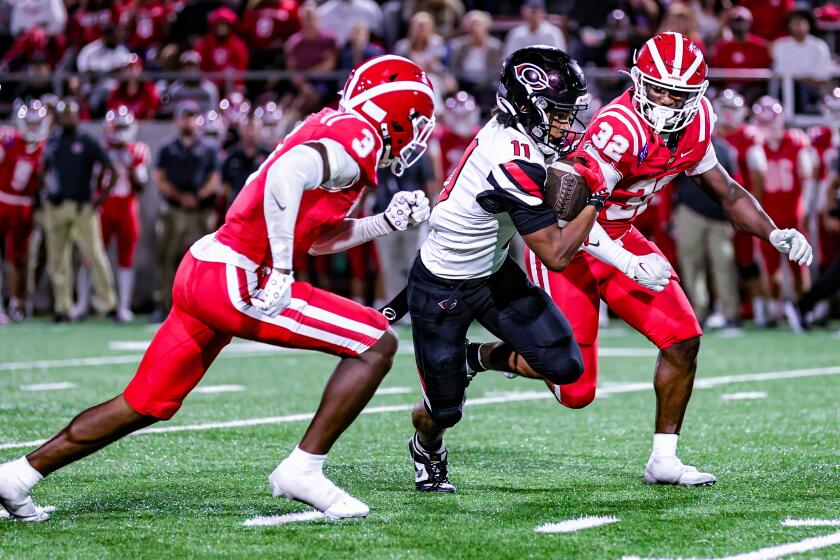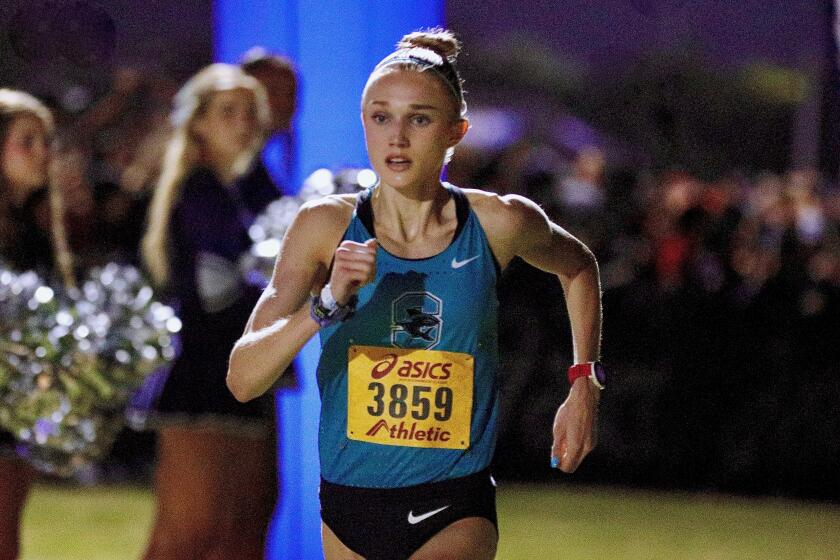For One, for All
This is the season of high school homecomings. A time of reunions and reminiscing and sharing stories about when we were young with peers who suddenly seem old.
This is the time of year when those trips to the gym matter, when those faded degrees we earned glitter again, when the high-wire lifestyle that lifted us above the mundane lives of ex-classmates sounds better than we thought.
Homecoming in America is a measure of our lives, a reminder of our dreams.
That is especially true when a high school reunion is wrapped into the tradition of a Friday night football game and a Saturday homecoming dance and a chance to remember being prom king or a three-year letterman or the senior class president.
I actually was those things. But here at Ft. Campbell High School, where I graduated more than 35 years ago, few remember and even fewer care. There are other, more pressing matters.
The military base where I attended high school -- and, more recently, homecoming -- straddles the Kentucky-Tennessee border and is home to the 101st Airborne Division, the famed Screaming Eagles, many of whom are currently deployed in Iraq.
It is also the nesting place for the Ft. Campbell High School Falcons, with a student body of only 560 military dependents -- most of whom, given the transient nature of military life, will be here for only a short stay.
When I went to high school here, FCHS was even smaller -- which explains why I was a three-year letterman -- and our tucked-away lives could barely corral our teenage ambitions.
We were an eclectic group of only 58 seniors -- which explains why I was elected class president -- born in 22 different states and a half-dozen different countries.
As “military brats,” constantly on the move, we had to adjust quickly to life’s sudden changes, adapt to fleeting relationships and appreciate the lasting friendships that somehow endured over long distances and leaps of time.
Ours was a foreign world to outsiders.
We lived on a base segregated by rank, run by a military hierarchy. The cars we drove had bumper stickers color-coded by rank so one could easily see whose parent was an officer (with a blue tag) and whose was an enlisted man or noncommissioned officer (with a red tag). The higher the rank, the lower the tag’s number.
The caste system meant more to some students than others. I recall how a general’s son drove some of us in his family car out the main gate and was miffed that the guard had not saluted as we drove past. To our chagrin, the general’s son turned around and drove back through the gate, forcing the soldier to salute this car full of teenagers with the blue, single-digit tag.
As dependents, we lived in separate communities based on military rank and went to swimming pools and social clubs separated by the same distinction. I, a sergeant’s son, once dated a colonel’s daughter. When she went for a swim in the officers’ pool, I had to sit on the grass outside and speak to her through a chain-link fence.
But at the high school, things were different.
We were joined at the teenage hip by our shared angst and common anxieties and by our youthful bravado and our desire to be independent. The children of sergeants socialized easily with the offspring of colonels. The sons of both officers and enlisted men -- this being a time when girls’ sports were nonexistent and women as career officers were rarities -- played side-by-side on athletic teams. We were all Falcons.
This was the civil rights era, when some schools had yet to be integrated. And when our football team traveled through Tennessee and stopped at a hamburger stand that refused to serve our black players, we all refused to eat and marched back onto the bus.
We were all Falcons.
I could still see my old classmates as I walked through the hallways at homecoming and gazed at the class picture that still hangs there. I borrowed a yearbook from the library and smiled at the portraits of perpetual youth we had left far behind. I stopped by the house where my family had lived and met a stranger in the building who offered to take a picture of me in front of the stoop that I had used as a backstop for the rubber ball I threw.
I was alone in revisiting my youth, the only member of the Class of ’66 who made it back. It was a homecoming of one, so I decided to surprise old classmates with a phone call from the past.
I phoned Jerry, one of the football co-captains, who had gone on to West Point and is now an administrator at the University of Rhode Island. I called Bob, another co-captain, who builds television transmitters on 10,000-foot mountains in Wyoming. And I spoke to Joaquina, the valedictorian and prom queen who danced with me so many years ago and is now the mother of three, living in Pennsylvania and sounding as beautiful as she was when her 17-year-old prom king took her hand.
As I brought homecoming to them, Jerry reminded me of how the reality of military life was never far away from our teenage lives, of how, in the summer of 1965, we felt the hammer of war.
During that break between our junior and senior years, we lost more than a third of our class as the 101st Airborne launched its first major deployment to Vietnam. My father’s heart ailment spared him as his unit departed. But as other fathers went off to war, their families moved back to hometowns across the country or simply moved off base to local towns, and our classmates quietly disappeared from our lives.
Some students whose fathers were deployed managed to stay at the school, but the possibility of dreaded news hovered constantly over us and sometimes swooped in. The salutatorian of our class learned of his father’s death in Vietnam less than a week before graduation.
Today, things are different, of course -- and yet, they aren’t.
When the men and women of the 101st were deployed to Iraq last spring and earlier to Afghanistan, many of their families remained at Ft. Campbell. And many of their children continued at the high school, doing their work and trying hard not to worry.
Sitting in a classroom as a guest speaker, I asked how many students had mothers or fathers serving abroad. Most raised their hands. One girl said wistfully that her father had missed her 17th birthday. A senior lamented that his father would be absent for graduation. Another said she wished her father could be with her as she sifted through college choices.
Later that night, as I watched Ft. Campbell win its homecoming game behind a star sophomore with dazzling football skills, I recalled how this same student had talked earlier about wishing that his father, now in Iraq, could be there to see him play.
About seven in 10 Ft. Campbell students have a mother or father serving abroad -- most of them in Iraq -- and some faculty members have spouses serving overseas, as well.
All these people waiting for loved ones to come home for good.
I realize that is the homecoming bond I have with those who are still here at Ft. Campbell, students so many decades younger than I and walking the same road so many years after my classmates have gone.
As I stood around the bonfire and watched the pep rally and cheered at the football game and ate in the cafeteria and marveled at the young people dancing, I could hear their voices echo through my past and sense their youthful words changing an aging heart.
That mine was a “homecoming for one” no longer mattered. That fact had been eclipsed by what matters most at my alma mater: a “homecoming for all.”
Get our high school sports newsletter
Prep Rally is devoted to the SoCal high school sports experience, bringing you scores, stories and a behind-the-scenes look at what makes prep sports so popular.
You may occasionally receive promotional content from the Los Angeles Times.



